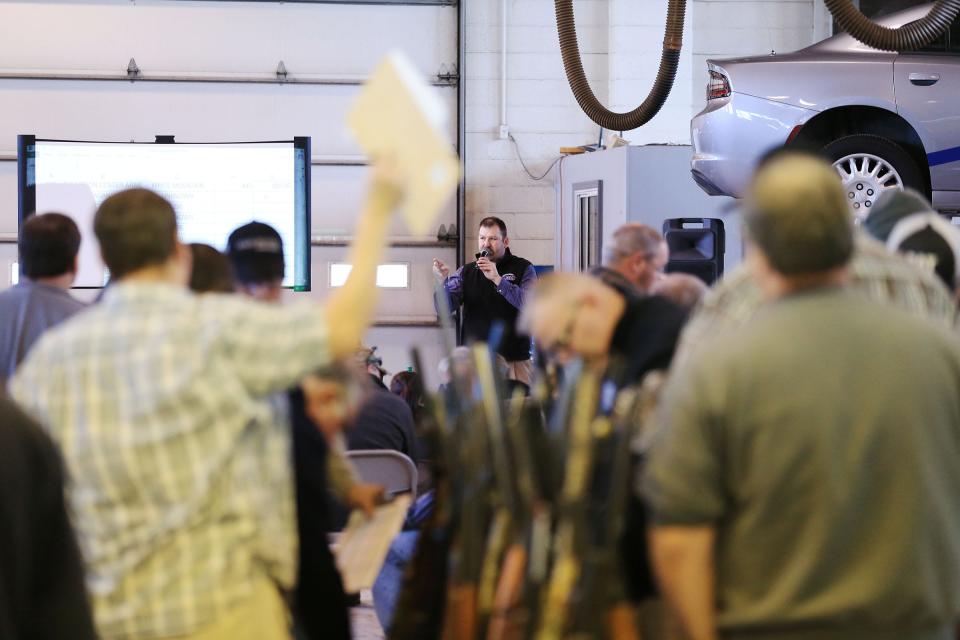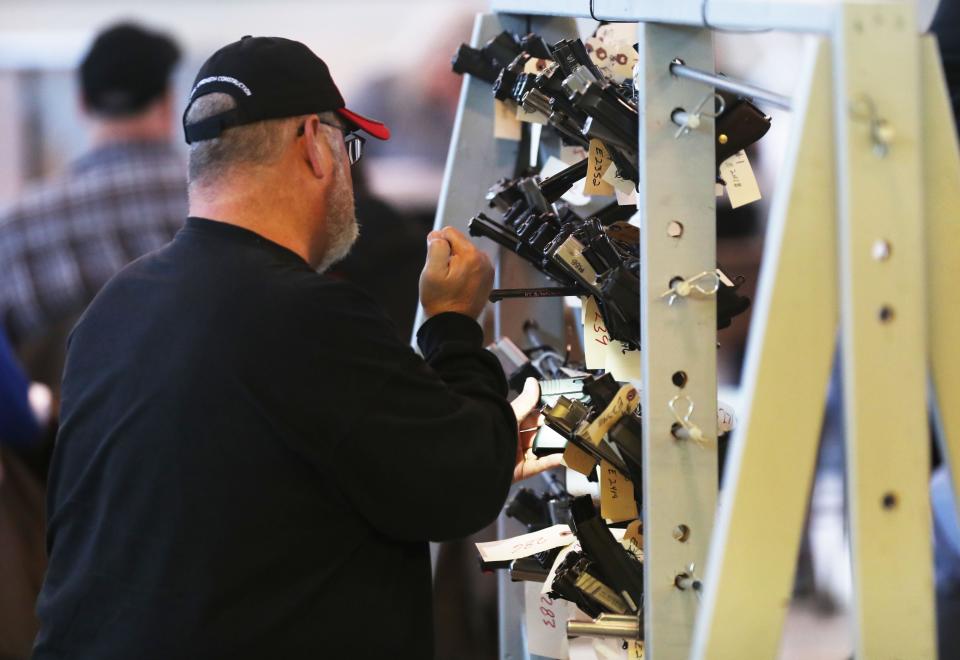Thousands of guns are seized each year in Tennessee. So what happens to them all?
In a large city that struggles with gun violence, Metro Nashville police have seized more than 15,000 firearms just in the past six years.
So what happens to most of those guns?
Police store them indefinitely.
Tennessee is one of a handful of states that prohibit police agencies from destroying guns seized in crimes or recovered in buyback programs. Instead, some departments sell the guns at auctions or trade them for upgrades, while others opt to store the weapons so they won’t go back into circulation — where they could be used in new crimes.
Disposal of confiscated guns has long been a controversial issue in law enforcement.
Many progressive cities like Los Angeles, Chicago and New York destroy guns, while several conservative states in recent years have done the opposite, passing laws that ban the destruction of guns, in some cases after lobbying from the National Rifle Association.
Kentucky has taken it a step further, mandating that all recovered guns be sold at auction in a program that generates millions for state law enforcement. But the effort has been met with pushback and new proposed legislation from lawmakers who argue that guns used in violent crimes should never again see the light of day.
But the gun destruction process has raised other concerns.
A recent New York Times investigation found that police agencies across the country were handing off firearms to companies that instead of fully destroying the weapons were reselling the parts in gun kits.
The Tennessean reviewed several law enforcement agencies across the state and found different practices across the state. While some larger agencies store guns, smaller departments hold auctions that they say helps their budgets.
Henry County Sheriff Josh Frey in West Tennessee said an auction last year netted around $100,000 for his department. The auction featured hundreds of firearms and even some BB guns and crossbows.
“For smaller agencies like us and so many others across the state it’s a boost for our budget,” he said. “We can use it to get some good things and we don’t have to ask the taxpayers for that money.”
A Tennessee law forbids destruction of confiscated guns
Tennessee allowed law enforcement to destroy confiscated guns up until 2010, when then-Democratic Gov. Phil Bredesen signed a law banning the practice.
The bill, which was heavily backed by the National Rifle Association, was signed into law on the same day that a mentally ill man at the Pentagon shot and wounded two police officers using a gun that had originally been confiscated and later traded by the Memphis Police Department.
Today, the Memphis Police Department says it exchanges confiscated guns for equipment, like ammunition or body armor, using city contacts with approved vendors.
“This process is done periodically throughout the year, allowing the department to have adequate storage space for weapons seized,” Memphis Police Sgt. Louis Brownlee wrote in an email.
Brownlee said the department occasionally will petition the courts to be allowed to destroy weapons if they are unsafe or inoperable.
In Nashville, the stockpile keeps growing.
The department on average seizes more than 2,000 guns each year. Last year, it seized 2,909 firearms. It has also collected 79 guns in a retrieval program with local churches, said Metro Police spokesperson Kristin Mumford. The department does not sell or trade guns and keeps them in storage.
“We keep our crime guns and we can use them for testing to determine whether they have been used in other crimes and that may help us solve cases,” she said.
For instance, the guns used in the Covenant School mass shooting that killed six people last year are also in storage.
While Nashville hasn’t said whether it has storage space concerns, departments in North Carolina have said they’re bursting at the seams with stored weapons and have pushed to change the state law.
Selling guns at auction

The Chattanooga Police Department also chooses not to sell or trade seized guns and instead keeps them in storage. The department said it recovered 1,030 guns last year.
Like Memphis, the Knoxville Police Department also trades seized firearms for new equipment or upgraded duty weapons, spokesperson Scott Erland said.
“Trades have proven to be a cost effective method that allows us to get rid of seized guns as safely as possible and be good stewards of taxpayer dollars,” Erland said in an email.
In smaller towns, auctions have helped to supplement police budgets.
Gun debate: Tennessee Gov. Bill Lee signs into law bill allowing armed teachers
Frey, the sheriff in Henry County, said gun auctions bring extra funds for vehicle maintenance, new uniforms and other needs.
“We don’t want to just destroy them because they’re usable guns,” he said. “Before the law, I saw a lot of nice guns torched in half.”
Frey said winning bidders will go through the state background check process and anyone that fails will be disqualified from purchase.
Gibson County Sheriff Paul Thomas said his rural West Tennessee department seizes a fraction of guns each year compared to big cities, so auctioning makes sense. But he can see how other, larger departments may not want to recirculate weapons.
“We get a lot of people who are drunk with shotguns as opposed to AK47s,” he said.
A debate in Kentucky

In Kentucky, a battle has been brewing over a nearly 30-year-old law that forces police agencies to sell seized guns to the State Police to sell at auction.
The law has been staunchly criticized by Louisville Mayor Craig Greenberg, especially after it was announced that a gun used to kill five people at a bank shooting in the city last year would go to auction.
In a push to skirt the law, Greenberg last year directed Louisville police to remove the firing pins from every seized weapon heading for auction. While previous efforts to change the law have failed, a bipartisan bill is now pending that would require Kentucky State Police to destroy confiscated guns used in violence crimes.
The Kentucky State Police held their most recent audition on April 23. The winning bid for the whole cache was $161,500.
This article originally appeared on Nashville Tennessean: Tennessee law allows police to keep, sell or trade guns used in crimes

